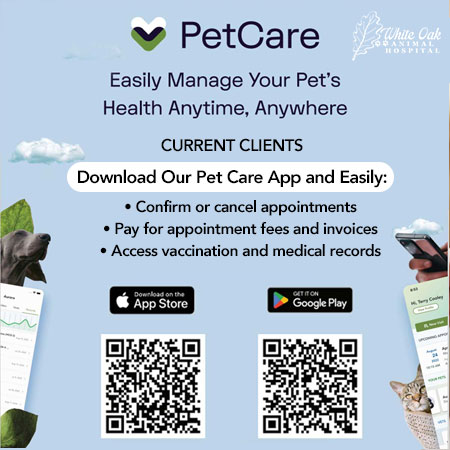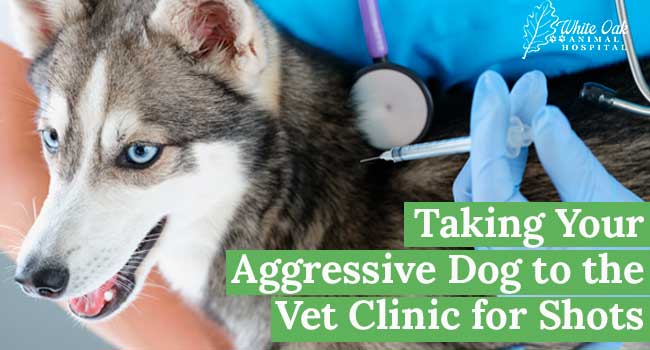
This article delves into the pivotal significance of vaccinations for dogs and the unique challenges that pet owners with aggressive dogs encounter during these necessary vet visits. When you have an aggressive dog, the term “vet visit” can evoke safety concerns for you, the veterinary staff, and your furry friend.
In the realm of responsible pet ownership, vaccinations stand as a cornerstone of canine health. While we recommend vaccines on a case-by-case basis, in general, these shots are not just preventive measures. They are vital shields against a plethora of potentially life-threatening diseases. However, the journey to vaccinate a dog is not always straightforward, especially when dealing with an aggressive canine companion.
By understanding these challenges and taking proactive measures, you can effectively manage the process of taking your aggressive dog to the vet clinic for shots. This ensures the safety and security of both your beloved aggressive dog and the dedicated veterinary team entrusted with their care. This collaborative effort fosters an environment where vaccinations can be administered effectively and without undue stress, ultimately safeguarding your dog’s health and the health of your community.
3 Common Misconceptions: Taking Your Aggressive Dog to the Vet Clinic for Shots
Aggression Is Always a Sign of Danger
 It’s commonly believed that an aggressive dog at the vet clinic signals a dangerous situation. However, it’s crucial to understand the complexity of this behavior. Aggression doesn’t inherently equate to danger; it often stems from fear, anxiety, or stress triggered by the unfamiliar vet clinic environment. This fear can result from past negative experiences or the presence of other animals’ scents. Fear and anxiety are significant factors in aggressive behavior, and many aggressive dogs are reacting to perceived threats. Recognizing these nuances can lead to more compassionate and effective approaches when taking your aggressive dog to the vet clinic for shots.
It’s commonly believed that an aggressive dog at the vet clinic signals a dangerous situation. However, it’s crucial to understand the complexity of this behavior. Aggression doesn’t inherently equate to danger; it often stems from fear, anxiety, or stress triggered by the unfamiliar vet clinic environment. This fear can result from past negative experiences or the presence of other animals’ scents. Fear and anxiety are significant factors in aggressive behavior, and many aggressive dogs are reacting to perceived threats. Recognizing these nuances can lead to more compassionate and effective approaches when taking your aggressive dog to the vet clinic for shots.
Aggressive Dogs Cannot Be Vaccinated Safely
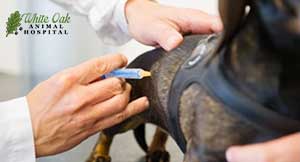 Another common misconception is that aggressive dogs cannot be vaccinated safely. This belief can deter pet owners from pursuing essential vaccinations for their aggressive canine companions. However, it’s vital to dispel this myth by highlighting the existence of safe vaccination procedures specifically designed for aggressive dogs. Veterinary professionals are trained to handle various behavioral challenges, including aggression, and can employ strategies to ensure that vaccinations are administered securely, protecting both the dog and the veterinary staff.
Another common misconception is that aggressive dogs cannot be vaccinated safely. This belief can deter pet owners from pursuing essential vaccinations for their aggressive canine companions. However, it’s vital to dispel this myth by highlighting the existence of safe vaccination procedures specifically designed for aggressive dogs. Veterinary professionals are trained to handle various behavioral challenges, including aggression, and can employ strategies to ensure that vaccinations are administered securely, protecting both the dog and the veterinary staff.
Aggressive Dogs Will Never Improve
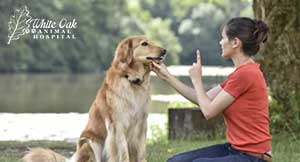 Another prevalent misconception that often discourages pet owners is the belief that aggression in dogs is a permanent and unchangeable behavior. This misconception can lead to feelings of hopelessness and resignation. However, it’s essential to address this misconception and shed light on the fact that aggression in dogs can be managed and improved with the right approach. By sharing success stories and examples of aggressive dogs that have become more manageable through training, patience, and expert guidance, we aim to provide reassurance and encourage pet owners not to give up on their beloved aggressive dogs and prioritize taking their aggressive dogs to the vet clinic for shots while seeking positive change.
Another prevalent misconception that often discourages pet owners is the belief that aggression in dogs is a permanent and unchangeable behavior. This misconception can lead to feelings of hopelessness and resignation. However, it’s essential to address this misconception and shed light on the fact that aggression in dogs can be managed and improved with the right approach. By sharing success stories and examples of aggressive dogs that have become more manageable through training, patience, and expert guidance, we aim to provide reassurance and encourage pet owners not to give up on their beloved aggressive dogs and prioritize taking their aggressive dogs to the vet clinic for shots while seeking positive change.
How Misconceptions Affect Pet Owners’ Decisions
Fear-Based Decision-Making
 When it comes to taking your aggressive dog to the vet clinic for shots, fear can be a formidable adversary. Many pet owners, influenced by misconceptions about aggressive dog behavior, find themselves making decisions based on this fear. The belief that their dog’s aggression will inevitably lead to dangerous situations at the vet clinic can deter them from seeking essential vaccinations. This fear-driven decision-making can have significant consequences for both the dog and the community.
When it comes to taking your aggressive dog to the vet clinic for shots, fear can be a formidable adversary. Many pet owners, influenced by misconceptions about aggressive dog behavior, find themselves making decisions based on this fear. The belief that their dog’s aggression will inevitably lead to dangerous situations at the vet clinic can deter them from seeking essential vaccinations. This fear-driven decision-making can have significant consequences for both the dog and the community.
By avoiding necessary vet visits, aggressive dogs miss out on crucial vaccinations and exams that protect them from potentially life-threatening diseases. Addressing these fears through education and understanding can lead to more informed and responsible choices when taking your aggressive dog to the vet clinic for shots, ultimately benefiting the well-being of all involved.
Delayed Vaccination Schedules
When taking your aggressive dog to the vet clinic for shots, misconceptions can lead to postponing vital vaccinations and annual care exams. Fear-driven decisions rooted in the misconception that aggression will inherently lead to danger can result in delayed or skipped vaccinations. However, this delay doesn’t resolve the issue but prolongs it. Aggressive dogs missing vaccinations remain vulnerable to preventable diseases. It’s essential to address these misconceptions through education and professional guidance for responsible pet ownership.
Potential Risks Associated with Taking an Aggressive Dog to the Vet Clinic
Safety Concerns
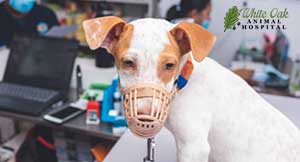 When taking your aggressive dog to the vet clinic for shots, safety concerns are paramount. These concerns extend to the well-being of veterinary staff, your dog, and other animals in the clinic. A controlled and cautious approach is essential to ensure that interactions are as safe as possible. Veterinarians and their teams are trained to handle such situations, making it crucial to communicate openly about your dog’s behavior to develop appropriate safety measures.
When taking your aggressive dog to the vet clinic for shots, safety concerns are paramount. These concerns extend to the well-being of veterinary staff, your dog, and other animals in the clinic. A controlled and cautious approach is essential to ensure that interactions are as safe as possible. Veterinarians and their teams are trained to handle such situations, making it crucial to communicate openly about your dog’s behavior to develop appropriate safety measures.
Stress and Anxiety
Taking your aggressive dog to the vet clinic for shots can be a stressful experience for both your pet and the veterinary staff. Vet visits can take an emotional toll on aggressive dogs. The unfamiliar environment, medical procedures, and interactions with unfamiliar people and animals can heighten their stress and anxiety. Strategies for reducing these negative emotions in aggressive dogs are vital. Veterinarians can employ techniques like low-stress handling and consider sedation when necessary to minimize stress during examinations and vaccinations.
Mitigating Misconceptions and Ensuring Safe Vet Visits
Veterinarians play a pivotal role in educating pet owners about aggression in dogs. They can provide resources and guidance for understanding and managing aggressive behavior. By fostering education and awareness, misconceptions can be mitigated, and pet owners can make informed decisions when taking their aggressive dogs to the vet clinic for shots. This collaborative approach ensures that both the dog’s health and the safety of everyone involved are prioritized. Veterinarians are valuable sources of knowledge when it comes to handling aggressive behavior in dogs. They can offer guidance and resources to help pet owners understand and manage aggression effectively.
When it comes to taking your aggressive dog to the vet clinic for shots, it’s crucial to address potential risks and misconceptions. Safety concerns for both veterinary staff and the dog itself need careful consideration, emphasizing the importance of a controlled and cautious approach during examinations and vaccinations. Furthermore, the emotional toll on aggressive dogs during vet visits, characterized by heightened stress and anxiety, should not be underestimated.
Strategies such as low-stress handling and, when necessary, sedation can play a pivotal role in minimizing these negative emotions and ensuring a safer environment for everyone involved when taking your aggressive dog to the vet clinic for shots. Strategies like low-stress handling and, when necessary, sedation can play a pivotal role in minimizing these negative emotions and ensuring a safer environment for everyone involved. While misconceptions can be daunting, seeking professional guidance and understanding that aggression doesn’t always equate to danger are essential steps.
 By doing so, you can ensure your aggressive dog receives the necessary vaccinations, safeguarding their health and the well-being of the broader community. For comprehensive care and guidance, consider scheduling an appointment at White Oak Animal Hospital, where Dr. Damron offers integrative options not available elsewhere, including TCVM Telemedicine consultations, built upon 28+ years of experience treating over 6,000 pets. Make informed decisions to prioritize your dog’s health and overall well-being.
By doing so, you can ensure your aggressive dog receives the necessary vaccinations, safeguarding their health and the well-being of the broader community. For comprehensive care and guidance, consider scheduling an appointment at White Oak Animal Hospital, where Dr. Damron offers integrative options not available elsewhere, including TCVM Telemedicine consultations, built upon 28+ years of experience treating over 6,000 pets. Make informed decisions to prioritize your dog’s health and overall well-being.
Related Posts
-
Holistic Dog Vet Near Me: Exploring 4 Incredible Alternative Therapies for Canine Health
It's not easy to find a holistic dog vet near me! Holistic pet care has…
-
Benefits Of Natural Herbs For Dog Dandruff
Does your pup have dog dandruff? Additionally, they may also have: Occasional dry, lusterless coat…
-
Learn How To Alleviate Dog Leg Pain Naturally
Dog arthritis is the top cause of chronic dog leg pain. Arthritis affects approximately 20%…
-
Learn How to Alleviate Dog Tremors Naturally
Dog tremors are sometimes mistaken for dog seizures. Consult your veterinarian to confirm whether your…






